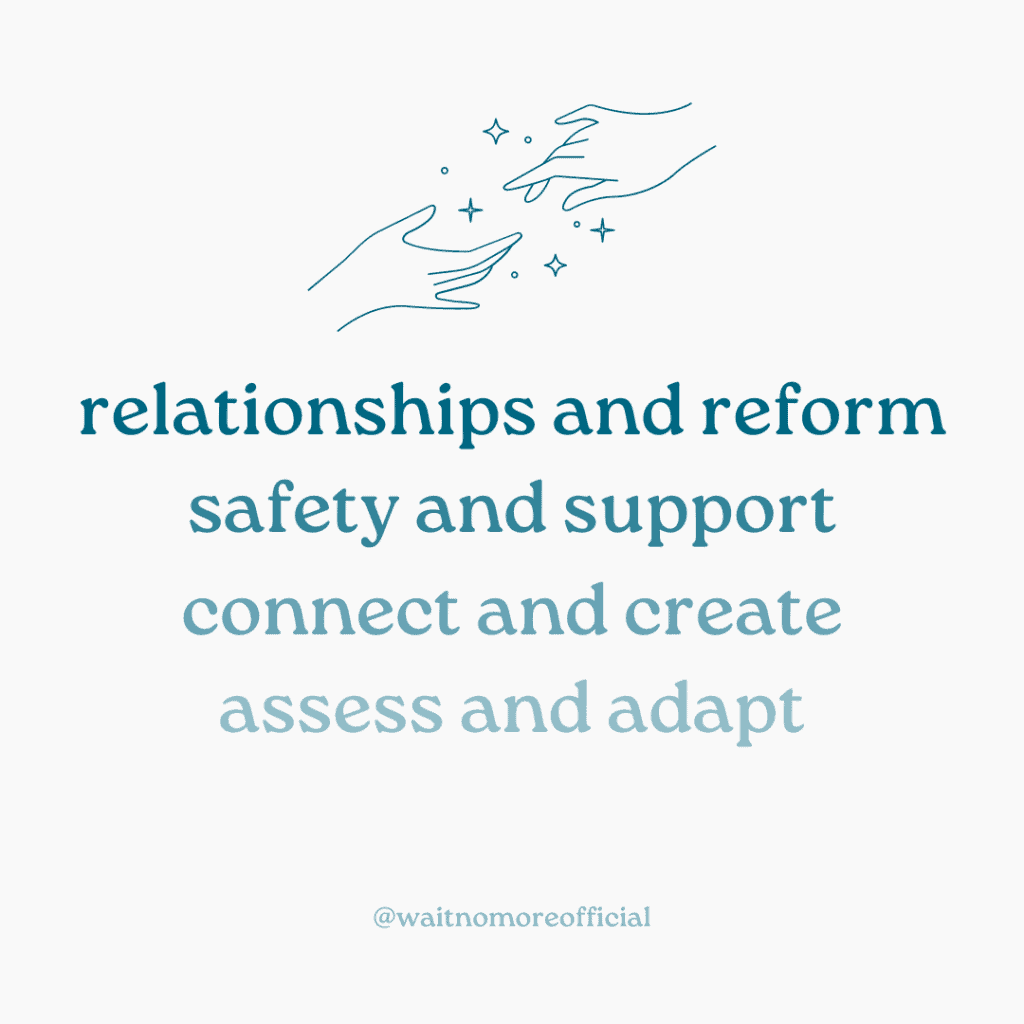Social workers are often misunderstood. Some people would say they take children; some might describe their role as do-gooders. As a licensed clinical social worker for over thirty years, I am delighted to be part of the social work profession and want others to understand social workers and what we do. Let me tell you a little about what social workers do and how they can impact the lives of children, families, and communities.
Social workers experience the privilege of seeing people up close, seeing their beauty and hope while sometimes seeing them at their worst. Due to multiple challenges, such as economic conditions, substance misuse, or trauma histories, children and families may struggle. The struggles may result in interventions by various well-intentioned organizations trying to fix the situation. These moments are when social workers enter so they can walk beside the child or family as they feel isolated and be that person in their corner while they work to rebuild their lives. They can also elevate the family’s needs or become their voice.
One of the things I love about being a social worker is the opportunity to walk alongside others as they experience unknown pathways. Sometimes the important thing is to hold space for families and youth as they figure out what they need and want. Holding space is when we don’t try to fix a situation; we create a place for others to pause and determine what they want or need. God can speak when we are quiet and still (Psalm 46:10).

Social workers have opportunities to work with families before their children enter out-of-home care, including foster care, group homes, or residential facilities. We know now that children do better when they are with their families or relatives; thus, social workers focus on strengthening families so they can safely parent their children. Sometimes parenting may include help from relatives, organizations, or churches. This is where we can all step in—to provide transportation, school resources, or emotional and physical support. Think about a time you felt stuck and what helped you through. It probably was not a six-step plan or worksheet but rather a person showing up for you in a meaningful way. While social workers are often assigned these roles, God designed that we all show up—particularly for widows and orphans (James 1:27).
Showing up doesn’t mean that we need to fix others. Instead, it creates the opportunity for others to be seen and heard, finding their way. When Job’s friends heard about all the troubles that came upon him, they set out from their homes and met together by agreement to go and sympathize with him and comfort him. Then they sat on the ground with him for seven days and nights. No one said a word to him because they saw how great his suffering was (Job 2:11-13).
Friends, this is showing up—not fixing. Can you sit with someone without saying anything? Social workers do this, and you can do this too. It’s what we all need: to be seen, heard, and valued. That is the work of God’s kingdom, and families benefit as they realize someone is there for them. Families know what they need; they just need someone to ask.
The roles that social workers engage in are varied. Let’s explore the value that social workers add to the trajectory that families and youth may experience.

They build networks of support and relationships that encourage healing while looking at systemic changes that modify laws, policies, and procedures. Social workers are changing practices to focus on keeping children with their families where they can heal. One way to do this is to build relationships with the family to garner their feedback and input in the decision-making process so that the professionals aren’t the ones making the decisions.
Social workers create physical and psychological safety while supporting the family in the process, no matter what. Staying the course is what creates safety and provides support.
Social workers connect families with the resources they need to heal and thrive. These resources might include music, art, drama, or animals.
Social workers gather relevant information to make informed assessments and adapt strategies to meet the youth and family’s unique needs. Their priority is getting the information straight from families, not their files. This practice builds trust and safety, leading to positive outcomes of families staying together.
Traditional strategies center on crisis management and are based on the belief that removing a child from their home is the only way to address the family’s challenges. This layer of trauma creates a lifelong impact. Once a child is removed, the memory can’t be erased. Social workers work diligently to surround families with healing support so the family can stay intact and move through the challenges. This journey may take significant effort and time, but it is well worth it. Building a trusting relationship takes time and energy. However, it reaps positive outcomes as families reclaim their lives and goals because someone is holding their pain for them.

Social workers lean into the relationships of those they work with. They may hold conflicting values such as chaos and peace, joy and sadness, hope and discouragement, and pain and healing. They guide families as they navigate these dilemmas giving encouragement, guidance, and resources.
Social workers keep the human element at the forefront of all they do. From a Christian social worker’s perspective, God’s wisdom is a priority so there can be a focus on the family’s needs and wants rather than only managing a case. This important distinction is a high calling that God equips with His wisdom, insights, and grace.
All of these things, I hope, has created a better understanding of social workers. I consider being a social worker a high honor and great responsibility. My goal is to avoid harming families, and I want to see families heal and thrive. My colleagues and I diligently work to serve struggling families so they can know God’s love, His provision, and have support from those who can walk alongside them now and in the future.
Won’t you step in? Engage with families. You don’t need to know what neuroscience is. You need to know how to give grace and show up for people without judgment. This is God’s plan for His children—that we get involved. Blessings arrive when we do. When we impact individuals, we always affect their families, which leads to changes in neighborhoods and communities.
The post Understanding Social Workers appeared first on Focus on the Family.
Continue reading...
Understanding What Social Workers Do
Social workers experience the privilege of seeing people up close, seeing their beauty and hope while sometimes seeing them at their worst. Due to multiple challenges, such as economic conditions, substance misuse, or trauma histories, children and families may struggle. The struggles may result in interventions by various well-intentioned organizations trying to fix the situation. These moments are when social workers enter so they can walk beside the child or family as they feel isolated and be that person in their corner while they work to rebuild their lives. They can also elevate the family’s needs or become their voice.
Walking Alongside Others
One of the things I love about being a social worker is the opportunity to walk alongside others as they experience unknown pathways. Sometimes the important thing is to hold space for families and youth as they figure out what they need and want. Holding space is when we don’t try to fix a situation; we create a place for others to pause and determine what they want or need. God can speak when we are quiet and still (Psalm 46:10).

Social workers have opportunities to work with families before their children enter out-of-home care, including foster care, group homes, or residential facilities. We know now that children do better when they are with their families or relatives; thus, social workers focus on strengthening families so they can safely parent their children. Sometimes parenting may include help from relatives, organizations, or churches. This is where we can all step in—to provide transportation, school resources, or emotional and physical support. Think about a time you felt stuck and what helped you through. It probably was not a six-step plan or worksheet but rather a person showing up for you in a meaningful way. While social workers are often assigned these roles, God designed that we all show up—particularly for widows and orphans (James 1:27).
Social Workers Don’t Fix Others
Showing up doesn’t mean that we need to fix others. Instead, it creates the opportunity for others to be seen and heard, finding their way. When Job’s friends heard about all the troubles that came upon him, they set out from their homes and met together by agreement to go and sympathize with him and comfort him. Then they sat on the ground with him for seven days and nights. No one said a word to him because they saw how great his suffering was (Job 2:11-13).
Friends, this is showing up—not fixing. Can you sit with someone without saying anything? Social workers do this, and you can do this too. It’s what we all need: to be seen, heard, and valued. That is the work of God’s kingdom, and families benefit as they realize someone is there for them. Families know what they need; they just need someone to ask.
Understanding the Value of Social Workers
The roles that social workers engage in are varied. Let’s explore the value that social workers add to the trajectory that families and youth may experience.

Relationships and Reform
They build networks of support and relationships that encourage healing while looking at systemic changes that modify laws, policies, and procedures. Social workers are changing practices to focus on keeping children with their families where they can heal. One way to do this is to build relationships with the family to garner their feedback and input in the decision-making process so that the professionals aren’t the ones making the decisions.
Safety and Support
Social workers create physical and psychological safety while supporting the family in the process, no matter what. Staying the course is what creates safety and provides support.
Connect and Create
Social workers connect families with the resources they need to heal and thrive. These resources might include music, art, drama, or animals.
Assess and Adapt
Social workers gather relevant information to make informed assessments and adapt strategies to meet the youth and family’s unique needs. Their priority is getting the information straight from families, not their files. This practice builds trust and safety, leading to positive outcomes of families staying together.
Traditional strategies center on crisis management and are based on the belief that removing a child from their home is the only way to address the family’s challenges. This layer of trauma creates a lifelong impact. Once a child is removed, the memory can’t be erased. Social workers work diligently to surround families with healing support so the family can stay intact and move through the challenges. This journey may take significant effort and time, but it is well worth it. Building a trusting relationship takes time and energy. However, it reaps positive outcomes as families reclaim their lives and goals because someone is holding their pain for them.

Social workers lean into the relationships of those they work with. They may hold conflicting values such as chaos and peace, joy and sadness, hope and discouragement, and pain and healing. They guide families as they navigate these dilemmas giving encouragement, guidance, and resources.
Social workers keep the human element at the forefront of all they do. From a Christian social worker’s perspective, God’s wisdom is a priority so there can be a focus on the family’s needs and wants rather than only managing a case. This important distinction is a high calling that God equips with His wisdom, insights, and grace.
An Honor and Responsibility
All of these things, I hope, has created a better understanding of social workers. I consider being a social worker a high honor and great responsibility. My goal is to avoid harming families, and I want to see families heal and thrive. My colleagues and I diligently work to serve struggling families so they can know God’s love, His provision, and have support from those who can walk alongside them now and in the future.
Won’t you step in? Engage with families. You don’t need to know what neuroscience is. You need to know how to give grace and show up for people without judgment. This is God’s plan for His children—that we get involved. Blessings arrive when we do. When we impact individuals, we always affect their families, which leads to changes in neighborhoods and communities.
The post Understanding Social Workers appeared first on Focus on the Family.
Continue reading...





